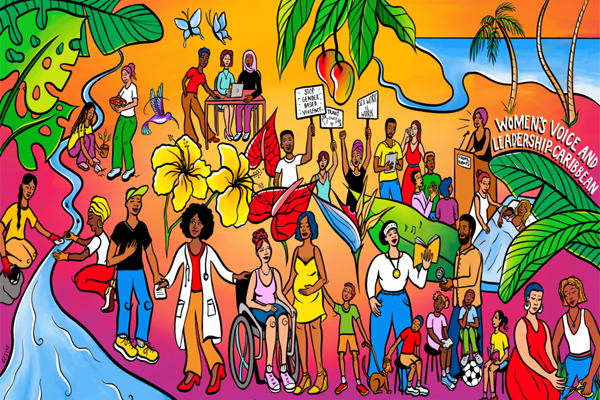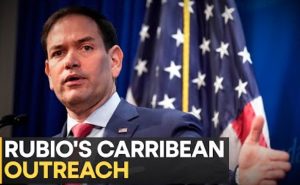
The Eighth Caricom-Cuba Summit kicked off on Tuesday in Bridgetown, commemorating the fiftieth anniversary of relations between the Caribbean Community and Cuba.
The decision was “particularly momentous” given “that it was made in the face of concerted pressure by both the Organization of American States (OAS) and the government of the powerful United States of America (USA) to impose a hemisphere-wide policy of isolation on revolutionary Cuba,” notes Barbados Today.
In his opening speech, Cuban President Miguel Díaz-Canel emphasized the harmonious coexistence and mutual enrichment of Caricom countries and Cuba, particularly with health policies, including the donation to the area of 144 000 doses of the island’s vaccines against Covid-19. (Prensa Latina)
He also referenced the Haitian crisis, and called for international solidarity with Port-au-Prince and the promotion of concrete formulas and projects, based on respect for sovereignty and self-determination.
The final declaration of the last summit, in 2020, emphasized the importance of combating climate change in the region, mutual health initiatives, and sustainable tourism. It expressed concern “over the inclusion of certain CARICOM Member States in lists of non-cooperative tax jurisdictions and call for a change in this approach which serves to negatively impact the economies of those countries,” and rejected the U.S. blockade against Cuba.
Regional Relations
- Díaz-Canel began his tour last Saturday in Saint Vincent and the Grenadines, and held talks with Prime Minister Ralph Gonsalves. On the occasion, he ratified the will to consolidate Cuba’s ties with the region and pointed out the multiple joint cooperation actions in the sectors of tourism, food production, human resources training, infrastructure and construction, as well as in health and medicines, reports Prensa Latina. Speaking at parliament, Díaz-Canel also ratified the accompaniment of Havana in the just demands for historical reparations for the damages of colonialism and slavery.
Finance and Economics
- The UN General Assembly has adopted by unanimous consensus a resolution that mandates the UN to set course for a global tax leadership role. “The historic decision is likely to mark the beginning of the end of the OECD’s sixty-year reign as the world’s leading rule maker on global tax, and will now kick off a power struggle between the two institutions with implications for global and local economies, businesses and people everywhere for decades to come,” according to the Tax Justice Network.
Democratic Governance
- Cuba’s new Penal Code, which came into force last week, risks further entrenching long-standing limitations on freedom of expression and assembly and is a chilling prospect for independent journalists, activists, and anyone critical of the authorities, according to Amnesty International.
- On Suriname’s Independence Day, last week, Indigenous leaders called on the government “to work seriously after today, together with us, on real justice, equality, recognition and protection of human rights, including ours; establishing strong dialogue structures so that decisions are made by the people and not by rulers who benefit themselves and their own group; setting the right priorities for the use of scarce resources.”
Public Security
- Jamaica’s government reimposed states of public emergency (SOEs) in several parishes, on Tuesday. Police said that in the areas where states of emergency were declared, 52 murders occurred in the two weeks before the imposition, 14 during the two weeks of the SOEs and 20 in the week after the SOEs were lifted. (Jamaica Gleaner, see last week’s post.)
Migration
- Rights groups have objected to the Dominican Republic’s crackdown on Haitian migrants. In the Dominican Republic, a majority of the population identifies as mixed race, while Haiti has a predominantly Black population. This has fueled accusations that xenophobia and racism are behind the deportations, reports Al Jazeera.
Climate Justice
- Forgiving debt in exchange for action on climate change is an increasingly popular political proposal, but one of the main challenges in making this concept a reality is that what, exactly, counts as climate action can be highly subjective, explains Pirate Wire Services.
- A robust assessment of losses and damages was featured in the recent IPCC Working Group II report, representing a major step forward in recognising existing negative impacts and future risks of climate change. The assessment provides strong support for increased action and support for loss and damage, urgent mitigation to limit global warming to 1.5°C, and more extensive adaptation. Adelle Thomas is a lead author on the Working Group II Summary for Policymakers. — Climate Analytics Blog
- Trauma from Hurricane Maria still haunts many in Puerto Rico. Communities inundated in southern Puerto Rico by Fiona are still recovering from the impacts of multiple storms. — Direct Relief report
- The Guyanese government’s planned location for a gas-to-energy project is unsuitable and will likely pose great danger to the country’s main groundwater aquifer, reports Kaieteur News.
- Though Guyana and U.S. oil giant ExxonMobil have inked an agreement for the massive Gas-to-Energy project being developed, the agreement cannot be made public just yet, the government informed parliament. (Kaieteur News)
Racial Justice
- A special issue of Recherches féministes is now available. Guest edited by Agnès Berthelot-Raffard and Hanétha Vété-Congolo, the issue centers on the theme: “Thinking about the subject of Black Francophone women” — Repeating Islands
Indigenous Rights
- The Guyanese Amerindian Peoples Association said that it will continue to support Chinese Landing, Isseneru and the Upper Mazaruni communities as well as those close to the Marudi Mountain in their respective land issues. The group specifically called on the government to “end its inexcusable pattern of inaction towards Chinese Landing.” (Kaieteur News)
Culture
- Trinidadian author “Ayanna Lloyd Banwo’s debut novel When We Were Birds is a spellbinding, beautifully told blend of love story and magical realism ghost story,” writes Leighan M Renaud in the Conversation.
- “In Nassau and San Juan, a host of new spaces are showcasing a revitalized arts scene,” says Marina Reyes Franco (curator at the MAC—Museo de Arte Contemporaneo de Puerto Rico) — Repeating Islands
- The UNESCO added the traditional knowledge held by Cuba’s light rum masters to its list of intangible heritage. The rum makers’ application to UNESCO, emphasized that”master knowledge is more than just a group of abilities,” and even incorporates moral strictures about public and private conduct, reports AFP.
Events
- 8 Dec. “The Haitian Conundrum: Challenges and Opportunities” — The IIR in collaboration with the Caribbean Policy Consortium and the H-Empire of the H-Net — Register
Opportunities
- Application for Island Innovation’s Ambassador Program are now open. The program forms an active network of engaged leaders with the purpose of positively impacting people, communities and environments around them.
- Call for papers: Turning the Tide: Climate Change, Social Change, and Islandness The Second International Conference on Small Island States and Subnational Island Jurisdictions. University of Aruba and University of Prince Edward Island
Just Caribbean Updates
https://caribbeannewsupdates.blogspot.com












